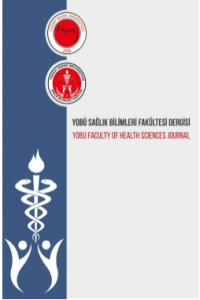Öz
Giriş: COVID-19 pandemi sürecinin kadınların sosyal, aile ve çalışma yaşamları üzerinde olumsuz etkileri bulunmaktadır. Bu durum kadınların fiziksel ve ruhsal sağlıkları açısından daha fazla risk altında olmasına neden olmaktadır. Amaç: Araştırmanın amacı pandemi sürecinde kadınların anksiyete ve yorgunluk düzeylerinin, bunları etkileyen faktörlerin, anksiyete düzeyleri ile yorgunluk düzeyleri arasındaki ilişkinin belirlenmesidir. Yöntem: Tanımlayıcı ve kesitsel tipte yapılan bu araştırmanın örneklemini Ocak-Nisan 2021 tarihleri arasında 268 kadın oluşturdu. Veriler, “Kişisel Bilgi Formu”, “Koronavirüs Anksiyete Ölçeği Kısa Formu” ve “Chalder Yorgunluk Ölçeği” ile toplandı. Verilerin analizinde Mann-Whitney U testi, Kruskal-Wallis testi ile Bonferroni düzeltmeli Mann-Whitney U testi kullanıldı. Sürekli iki değişken arasındaki ilişki Spearman Korelasyon Katsayısı ile değerlendirildi. Bulgular: Araştırmada kadınların yaş ortalamalarının 30,28±8,35 olduğu belirlendi. Kadınların Koronavirüs Anksiyete Ölçeği ve Chalder Yorgunluk Ölçeği puan ortalamalarının sırasıyla 2,83±3,74 ve 16,30±7,06 olduğu saptandı. Araştırmada bekar, üniversite ve üzeri öğrenime sahip, çalışan, çocuk sahibi olmayan katılımcıların yorgunluk düzeyleri ve COVID-19 tanısı alan katılımcıların ise hem anksiyete hem de yorgunluk düzeylerinin daha yüksek olduğu bulundu (p<0,05). Ayrıca katılımcıların anksiyete ile yorgunluk düzeyleri arasında anlamlı düzeyde pozitif yönlü bir ilişki belirlendi (r=0,388, p<0,001). Sonuç: Araştırmada katılımcıların anksiyete düzeylerinin düşük olduğu ancak mental ve fiziksel olarak yorgun oldukları belirlenmiştir. Ayrıca COVID-19 pandemi sürecinde kadınların anksiyete ve yorgunluk düzeylerinin medeni durum, öğrenim durumu, çalışma durumu, çocuk sahibi olma ve COVID-19 tanısı alma durumu gibi birçok faktörden etkilendiği saptanmıştır. Elde edilen bulgular doğrultusunda, kadının sosyal, aile ve çalışma yaşamı üzerine olumsuz etkileri bulunan pandemiye yeni uyum yollarının geliştirilmesi gerekmektedir. Bu açıdan kadınların bu süreçte psikososyal ve öz bakım alanlarda desteklenmeleri önemlidir.
Anahtar Kelimeler
Destekleyen Kurum
Araştırma herhangi bir kurum tarafından desteklenmemiştir.
Proje Numarası
-
Teşekkür
Araştırmamıza katılmayı kabul eden tüm kadınlara teşekkür ederiz.
Kaynakça
- Referans1 Wenham C, Smith J, Morgan R. COVID-19: The gendered impacts of the outbreak. Lancet 2020; 395:846-848. Referans2 Wilder-Smith A, Chiew CJ, Lee VJ. Can we contain the COVID-19 outbreak with the same measures as for SARS? The Lancet Infectious Diseases 2020; 20:e102-e107.
Öz
Introduction: The COVID-19 pandemic process has negative effects on women's social, family and working lives. This situation causes women to be at greater risk in terms of their physical and mental health. Objective: The aim of the study is to determine the anxiety and fatigue levels of women during the pandemic process, the factors affecting them, and the relationship between anxiety and fatigue levels. Method: The sample of this descriptive and cross-sectional study consisted of 268 women between January and April 2021. Data were collected with the “Personal Information Form”, “Coronavirus Anxiety Scale Short Form” and “Chalder Fatigue Scale”. Mann-Whitney U test, Kruskal-Wallis test and Bonferroni corrected Mann-Whitney U test were used in the analysis of data. The relationship between two continuous variables was evaluated with the Spearman Correlation Coefficient. Results: It was determined that the mean age of the women in the study was 30.28±8.35. The mean scores of the women on the Coronavirus Anxiety Scale and the Chalder Fatigue Scale were found to be 2.83±3.74 and 16.30±7.06, respectively. In the study, it was found that the fatigue levels of the single, university and higher education, working, and non-children participants, and both anxiety and fatigue levels of the participants diagnosed with COVID-19 were found to be higher (p<0.05). In addition, a significant positive correlation was determined between the anxiety and fatigue levels of the participants (r=0.388, p<0.001). Conclusion: In the study, it was determined that the anxiety levels of the participants were low, but they were mentally and physically tired. In addition, it has been determined that the anxiety and fatigue levels of women during the COVID-19 pandemic process are affected by many factors such as marital status, educational status, employment status, having a child and being diagnosed with COVID-19. In line with the findings, it is necessary to develop new ways of adaptation to the pandemic, which has negative effects on women's social, family and working life. In this respect, it is important to support women in psychosocial and self-care areas in this process.
Proje Numarası
-
Kaynakça
- Referans1 Wenham C, Smith J, Morgan R. COVID-19: The gendered impacts of the outbreak. Lancet 2020; 395:846-848. Referans2 Wilder-Smith A, Chiew CJ, Lee VJ. Can we contain the COVID-19 outbreak with the same measures as for SARS? The Lancet Infectious Diseases 2020; 20:e102-e107.
Ayrıntılar
| Birincil Dil | Türkçe |
|---|---|
| Konular | Hemşirelik |
| Bölüm | Araştırma Makaleleri |
| Yazarlar | |
| Proje Numarası | - |
| Yayımlanma Tarihi | 19 Aralık 2023 |
| Yayımlandığı Sayı | Yıl 2023 Cilt: 4 Sayı: 3 |


